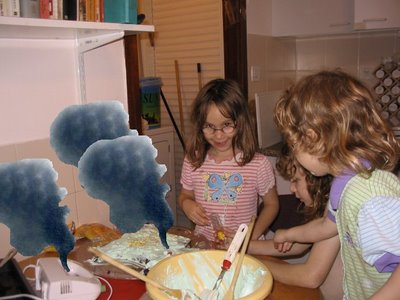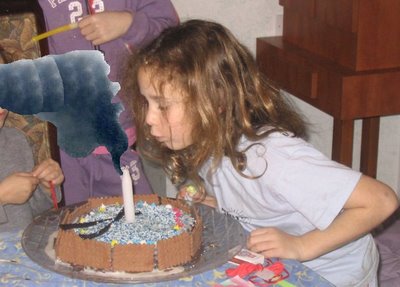Wednesday, August 09, 2006
A Few Things I've Learned While Blogging the War
- Blogging can both release tension, by being a good outlet to vent about all the outrages we otherwise keep bottled up -- especially during a controversial war. But it can also create its own tension.
As the war has ground on into its fourth week and my blogging has turned to all-conflict-all-the-time mode, I find now that I'm carrying around a feeling that I HAVE TO POST on the war. If I haven't posted anything in the last 24 hours explaining why Israel does not want to kill Lebanese civilians, I start to twitch.
And the worst thing for my chances of remaining sane is that when I get ideas for silly "off-topic" posts, the kind that used to drive my blog, I don't know what to do with them. I can't keep that stuff bottled up inside, and my draft folder is filling up with post ideas that I've been avoiding writing -- too busy fulfilling my duty to comment on the conflict instead. Well, henceforth, I'm reclaiming my blog and my sanity, or at least my blog. While I will certainly continue commenting on the war, frequently and at length when I have something to say about it, I'm done supressing every other thought.
Watch for a silly, off-topic post in this space soon -- maybe not tonight since Sharon and I are going to a concert, also to cling to a little sanity -- but soon. - Nasrallah is simply not as funny as Hamas. Hamas has been a humor goldmine for me. While they are lethal terrorists in one sense, at the same time they have a ridiculous style and sensibility about them that is easy to mock (check some of the Hamas posts on the sidebar and see if you agree).
Now I've been trying to write similar funny posts about Nasrallah, but with rare exception, all that comes out are deeply reasoned screeds and analyses, no goofy stuff. I've come to the conclusion Nasrallah needs to dye his beard red, or maybe purple so he'll have his own trademark. (UPDATE: a more indepth look at this bearded topic in my next post.) - I was starting to think that my anti-Reuters fixation was a neurosis for which I might need to seek therapy. I've dwelled on the bias in their photos and text so obsessively I've considered taking out a restraining order against myself. A few examples, so you'll know I'm not kidding:
- Settler, settler, settler... in which I notice that Reuters only exercises their objective journalistic integrity to avoid "judgemental" terms -- like terrorist -- when it suits them.
- Another post showed how Reuters takes an activity that all of us are perfectly familiar with -- like being checked with a metal detector -- and manages to create the subtle impression it is a unique Palestinian ordeal created by unfeeling and compassionless Israelis simply to humiliate them.
- There were also photographs from back in March showing how the photo-journalists create whole series of shots, where crowds of protestors are basically extras to lend authenticity to the staging of a few star actors on the scene who are photographed in various exciting poses. And they expect that newspaper readers who see only one photo in the series will have no idea how the depicted activity was likely managed.
- There is also the phenomenon of photographing any sad or somber Palestinian scene -- say a child crying; the reason for her tears don't matter -- and publishing it on the global wire as somehow newsworthy, useful for providing the desired "poor victims" context to completely unrelated news blurbs.
- Reuters engages in more than just a zealous willingness to believe, publish, or invent anything that will paint a damning picture of Israel. They're also suckers for any material that will help convince you that America is losing the war in Iraq, and that the US should surrender to brave insurgents who claim to be capturing US helicopters -- a claim which Reuters has no reason to doubt, so long as they don't investigate it.
But now the recent Reuters fake photo flap may be a sign that I'm not actually crazy. As others have pointed out, though, the issue with Reuters and some of the other agencies, isn't doctored photos alone -- although that is huge -- but also that they've maintained a policy of leaving their newswires wide-open for local "stringers" to pump raw Hamas and Hizballah propaganda right into your local news sources who make use of those newswires for much of their content. And don't forget to have a look at photos coming out of Iraq, which operate under a similar local-stringer process. - Settler, settler, settler... in which I notice that Reuters only exercises their objective journalistic integrity to avoid "judgemental" terms -- like terrorist -- when it suits them.
- Lastly, and most importantly, Reuters "photographer" Adnan Hajj has taught me how to remove dust spots from family photos, while simultaneously -- but completely and totally unintentionally -- enhancing their dramatic effect:



Unfortunately, his technique is only useful, as you can see, for removing the really, really big dust spots. Nevertheless, in these fake-but-accurate days, that's probably good enough for Reuters. (Didn't that phrase used to be "good enough for government work? Reuters -- the new government work.)







